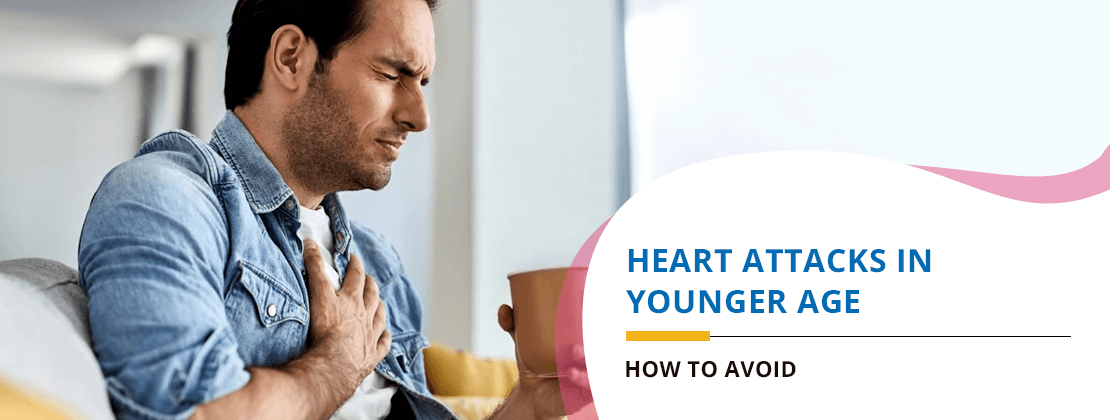
Home / Blog / HEART ATTACKS IN YOUNGER AGE: HOW TO AVOID
Table of Contents
In the vibrant state of Gujarat, a concerning pattern has emerged, casting a shadow over the joyous beats of Garba and the bustling lives of its younger populace. A series of sudden, tragic heart attacks among the youth has sparked alarm and sorrow in equal measure. The heart, a symbol of life and vitality, has unexpectedly become a point of vulnerability. This piece aims to shed light on this pressing issue, offering insights and guidance on how to safeguard our youth, our future, from the unforeseen peril of heart attacks.
Recent incidents in Gujarat have unveiled a silent threat lurking amidst our youth: unexpected heart attacks. From enthusiastic Garba dancers to diligent students, no demographic seems exempt from this unforeseen menace. The question arises – why are the young, seemingly healthy individuals falling prey to such fatal cardiac events? The answers may lie intertwined within our lifestyle, stress, and perhaps, the aftermath of the global pandemic.
A heart attack, medically known as myocardial infarction, is not exclusive to the elderly. It transpires when blood flow to a part of the heart gets blocked, often by a blood clot, hindering the oxygen supply to the heart muscle, and thereby causing damage. The common indicators can range from chest pain, and shortness of breath, to more subtle signs like indigestion, nausea, and excessive fatigue. Recognizing these signs early and seeking immediate medical attention is pivotal in mitigating damage.
While genetics play a role, lifestyle choices have emerged as significant contributors to early-onset heart issues. Elevated stress levels, sedentary lifestyles, unhealthy dietary habits, and tobacco usage have all been identified as potential risk factors. Moreover, the post-Covid era has ushered in its own set of challenges, with some individuals experiencing cardiac issues and complications post-recovery, further complicating the scenario.
Prevention, they say, is better than cure, and when it comes to heart health, this adage holds immeasurable weight. Adopting a heart-friendly diet, engaging in regular physical activity, abstaining from tobacco, managing stress, and undergoing routine health check-ups can significantly diminish the risk of heart ailments. Awareness about the signs and symptoms of heart disease, too, is crucial in facilitating early intervention and potentially saving lives.
In these trying times, HCG Hospitals stand as a beacon of hope and assurance, offering comprehensive cardiac care. With a team of seasoned specialists, state-of-the-art technology, and a patient-centric approach, HCG Hospitals not only provide curative care but also work tirelessly towards raising awareness, promoting preventive care, and safeguarding the heart health of the community.
Watch: Heartwise: A Journey to Healthy Hearts for the Young Generation
In the wake of the unsettling rise of heart attacks among the youth, preventive steps have become not just necessary but imperative. Here are some pivotal steps to consider:
Healthy Eating: Adopt a diet rich in fruits, vegetables, lean meats, and whole grains. Minimize intake of processed foods, sugars, and unhealthy fats.
Regular Exercise: Engage in at least 150 minutes of moderate-intensity exercise every week. This could include walking, cycling, or any form of physical activity that raises the heart rate.
Stress Management: Identify stressors and manage them effectively through meditation, yoga, or engaging in recreational activities.
Avoid Smoking and Limit Alcohol: Steer clear of tobacco in all forms and ensure alcohol is consumed in moderation.
Maintain Healthy Weight: Ensure your Body Mass Index (BMI) stays within the recommended range to avoid putting extra stress on your heart.
Regular Health Check-ups: Especially for those with a family history of heart disease, regular screenings can help in the early detection and management of risk factors.
In the realm of healthcare, the adage “Prevention is better than cure” rings particularly true. Preventive health check-up packages serve as a proactive health measure, enabling early detection of potential health issues before they escalate into formidable problems. These comprehensive packages, often tailored to age, gender, and medical history, encompass a series of tests and screenings aimed at monitoring vital health parameters.
At HCG Hospitals, we emphasize the profound impact of preventive healthcare in safeguarding against unforeseen medical emergencies, such as heart attacks, especially among the younger demographic. Our meticulously crafted health check-up packages are not merely a series of tests but a robust shield, ensuring that your heart continues to beat with unwavering vitality, safeguarding your health against the unforeseen perils of cardiac ailments. By prioritizing preventive healthcare, we not only safeguard ourselves but also alleviate the emotional and financial burden on our loved ones, ensuring a future where every heartbeat tells a story of enduring health and wellness.
The incidents of unexpected heart attacks among the youth have underscored an urgent need to prioritize heart health across all age demographics. It beckons a collective effort, intertwining awareness, lifestyle modifications, and accessible healthcare, to shield our youth from unseen cardiac threats. Let us pledge to safeguard our future, ensuring that every heartbeat continues to resonate with health, vitality, and life.